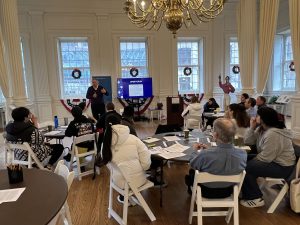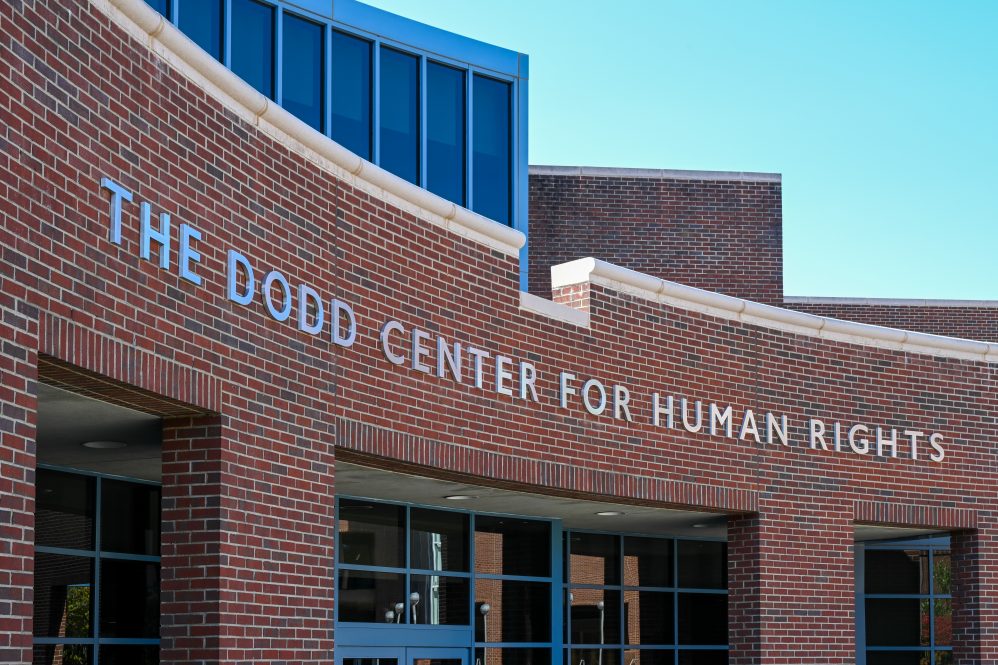As fractious election cycles become the norm and political unrest flares across the country, history professor Brendan Kane has noticed something curious: nobody argues about engineering.
“Most of the questions that really create division within communities are things that we might think of as cultural or humanistic,” he explains. “Nobody’s arguing about how to build a bridge – we know how to do that stuff. Rather, it’s about meaning and belonging and exclusion – that stuff that humanists spend their entire professional lives doing.”
Kane, a professor in the Departments of History and of Literatures, Cultures and Languages, is also the Director of the Democracy and Dialogues initiative (DDI) at the Dodd Center for Human Rights. Academically, he says, he has always been fascinated with “how people speak across difference.”
To that end, he pioneered the Encounters dialogue series in 2017. Part of the Dodd DDI, the program debuted the model of community dialogues on humanities subjects across the state. A recent grant from the National Endowment for the Humanities (NEH) and the Connecticut Humanities Council enabled Kane to expand this work into a new conversation series, “Dialogues for Common Ground: American Identity and Connecticut’s Civic Reconstruction.”
The Encounters discussion model seeks to move beyond the traditional means by which academics speak directly to the public — lectures and panels — and instead speak with communities. All Encounters events feature a decentralized setup, with community members seated at tables in small groups. (The model adapted to the pandemic era through use of Zoom breakout rooms.)

Participants’ first task is to talk with each other about the texts and topic at hand, whether it’s Gothic art or wealth inequality in the U.S. After the small group has its bearings, all the room’s participants come together to share their takeaways, before breaking back into small groups several times and concluding with an expert Q & A.
Kane says the idea behind the small group discussion approach is to increase participants’ familiarity and confidence with the subject material prior to inviting conversation with an academic expert. It lessens the power differential between academics and other community members, highlighting the fact that each has something to learn from the other. The model has been workshopped through years of Encounters.
Is it sturdy enough to stand up to the nation’s current political polarization? Kane thinks so.
His most recent series, “Dialogues for Common Ground,” put this premise to the test. It was funded through the NEH’s “A More Perfect Union” initiative, which supports projects that encourage civic engagement and commemorate the 250th anniversary of the United States’ independence in 2026. Using the Encounters community dialogue model, Kane and his team moved to discussions of the nation’s founding documents — the Declaration of Independence, the Bill of Rights, and the Constitution.
“Looking through and having dialogues around these founding documents helps us recognize the evolution of some of the provisions and policies and how they have changed and continue to change,” says Saah Agyemang Badu, a master’s student in public administration who is the graduate assistant for the Dodd DDI. Badu, Dodd Impact’s program manager Nana Amos, and former DDI graduate assistant and program manager Erica MacDonald worked with Kane to create and coordinate the Dialogues for the Common Ground series.
One of the dialogues’ main objectives was to engage with the actual text of these documents, rather than politicized versions that are frequently deployed in arguments. Even after stripping away the politicization, participants found plenty to discuss.
The project sought to demonstrate that these documents remain critically important for the nation’s future, as they continue to inform all federal lawmaking and influence the way all Americans perceive themselves as part of a political landscape.
“In analyzing these sacred documents, we are reminded of our active rather than passive role in its realization and meaningfulness to society,” Amos says.
As for Connecticut, these documents have shaped the state’s own laws and will continue to influence responses from the “land of steady habits” to the challenges of 21st century life. In-depth discussions on these texts also offer UConn experts a chance to forge connections with diverse communities around the state.
“The structure and format of Encounters helps have constructive conversation with respect for individual ideas being shared,” Agyemang Badu says.
“Dialogues for Common Ground” represents an extension of the University’s commitment to fostering civic engagement and nurturing what Kane calls “real-world skills of foundational importance”: speaking and listening respectfully, navigating tense conversations, and combatting misinformation by restoring community trust.
“At some level, it is absolutely about the text and it’s absolutely about community. It’s absolutely about knowledge and facts and scholarship. But some of it is just simply about — ‘OK, this is a tense situation. How do I function in a situation in which somebody’s being aggressive? There’s tension in the room, there’s bullying, there’s misinformation. What do I do?’” Kane says.
The 2023 spring slate of Encounters programming will be announced soon. For more information or to learn how to participate in Encounters, visit the Dodd Human Rights Impact website.



